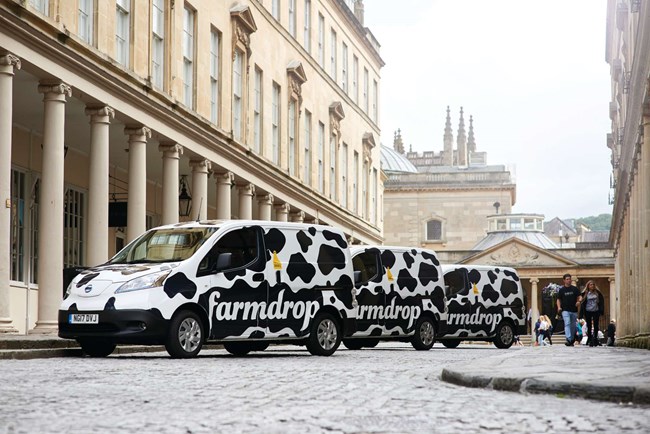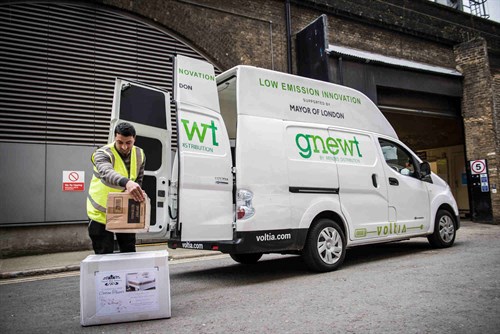- Tyres: The path of least resistance
- ETRUX receives Ford Pro Convertor status
- The Logistics Organisation adds to van fleet with Vanaways
- Northgate launches micromobility service
- Progress being made on shared EV charging, AFP reports
- Medisort electrifying van fleet with Bedeo
- ADVERTISEMENT FEATURE: Taking a shortcut to reduce commercial vehicle emissions
- The What Van? Road Test: Ford Ranger Raptor
- Speakers announced for Commercial Vehicle Show
- Check new vehicle registration details are correct, AFP tells fleets
What Van? Awards 2019: Innovation Award – LEVL-Geotab
Date: Thursday, December 13, 2018

Since adopting a Geotab telematics platform provided by LEVL for its fleet of electric vans in March 2018, online grocery business Farmdrop has seen dramatic, double-digit improvement in both efficiency and the behaviour of its drivers.
Farmdrop uses a fleet of 32 Nissan e-NV200 vans (pictured) and two Renault Kangoo Z.E.s to make last-mile deliveries in the cities of London, Bristol and Bath.
Head of growth Mike Pearson remarks: “LEVL and Geotab has helped us make our fleet safer and more efficient.
“Using the driver behaviour add-in, we have seen a 33% reduction in incidents of poor driving per mile. We have also seen a 27% reduction in the kW/mile we need to execute our London, Bristol and Bath routes.”
Farmdrop is an ethical grocer supplying local and sustainably produced food via an online platform and mobile app, so chose a telematics platform to extend its responsible business approach to its delivery operations.
Pearson adds: “Farmdrop’s mission is to fix the food chain, and so reducing emissions from food delivery is important to us. That’s why we use 100% electric delivery vehicles wherever possible.
“Geotab’s technology lets us know where our vans are, and how they are driven, saving us both time and money.”
The information available for fleet managers to see also includes showing whether, for example, there is sufficient range left for plug-in light commercial vehicles to complete delivery journeys.
Drivers, who have access to view their own performances, can be resistant to moving to electric vehicles so LEVL’s Geotab includes a gamification challenge to help get them on board. This has led to high engagement and acceptance from employees, according to Farmdrop, which drew up scores of driver performance based on speeding, seat belt use, harsh braking, acceleration and cornering.
“The majority of drivers who have picked it up in a positive way want to beat their own score and want to beat their peers’ scores on a monthly basis.
“And so, actually, it becomes an interactive solution and they get enjoyment out of seeing their scores improve,” says Pearson.
The insights on driving trends also become a useful tool for the management team, which identified a reduction in instances of poor driving behaviour of a third within four months of adopting Geotab. This improved safety and also had the knock-on effect of the vehicles being driven far more economically.
Going forward with LEVL’s support, Farmdrop plans to integrate Geotab into customer services to let their customers know about delays to deliveries and to provide accurate ETAs, and to use the software to measure driver downtime.
Highly Commended: Gnewt Cargo
The runners-up spot in this category goes to Gnewt Cargo for its two-year trial of electric LCVs in central London, where commercial freight vehicles make up 30% of road traffic.
The trial tests a set of innovative new vans. The Voltia (pictured), which is built on the foundation of the Nissan e-NV200, and BD Auto’s E-Ducato conversion both have an expanded capacity, meaning fewer vehicles are required for deliveries, causing less congestion. They were added to Gnewt’s existing fleet of electric vehicles and their emissions performance tested against comparable diesel delivery vans.
Backed by the mayor of London Sadiq Khan, the project is part of the Low Emission Freight and Logistics trial funded by the Office for Low Emission Vehicles in partnership with Innovate UK, the advisory research body that reports to the Department for Business, Energy and Industrial Strategy.
The project has installed smart charging points at the vans’ depot. This technology charges the vehicles at the most efficient time of day. The trial, which began in November 2017, will help both Gnewt Cargo and the mayor understand the additional demand on the grid created by electric vehicles and assess the potential for reverse vehicle-to-grid charging.

View The WhatVan Digital Edition


